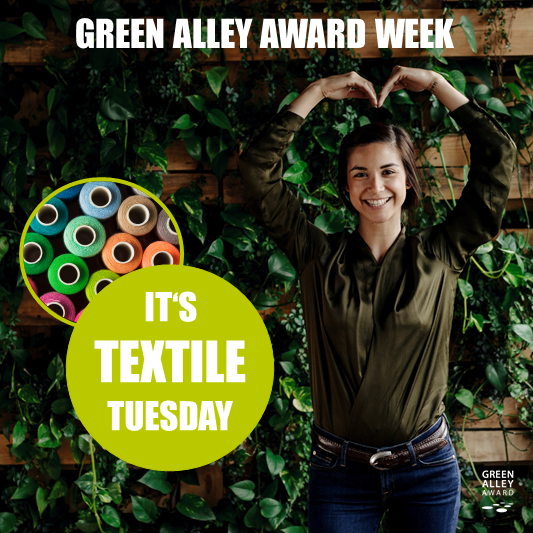
It’s Textile Tuesday!
A whole week full of news, insights and circular ideas!
It's Textile Tuesday!
Fast fashion is increasingly becoming a focus of the circular economy. This economic model aims at giving products more value through recycling and reusing.
“buy, wear, discard”
Fast fashion is a business model that relies on mass production, large volumes of sales and dumping prices. Customers have the chance to wear the styles from high-end fashion shows. The cheap clothes come from multinational retail chains. This luxury however comes at the price of lower quality materials and inadequate working conditions for laborer’s. Fast fashion constantly offers new styles. In 2000 European apparel companies offered two collections per year. Within just one year this number rose to 5. Today Zara is offering 24 new clothing collections each year and H&M has 12 to 16 collections on display.
Europeans use nearly 26 kilos of textiles and discard about 11 kilos of them every year. The impact on the environment is tremendous. In 2015 79 billion cubic metres of water were used by the fashion and textile industry. It takes 2700 litre of water to produce one single t-shirt. The same amount is enough drinking water for one person for 2, 5 years. 10 % of global greenhouse gases are caused by clothing and footwear production. This is more than all international flights and maritime shipping combined. And the list goes on and on….While this could be reason for depression and despair, let’s rather shine the light on those, who are actively working on finding solutions.
Pioneers fighting the clothes war
When we look at last year’s finalists, we can clearly see that the fashion and textile industry is increasingly becoming a focus of the Circular Economy. Three out of six of our finalists are working on solutions to make this industry branch more circular.
- Dimpora
Outdoor wear should be breathable and protect you from wind and water. But usually these features involve chemical processes and come with high costs for human health and the environment. Dimpora, a Swiss startup, has now developed a high-performing alternative to conventional toxic membranes that does not use any toxic chemicals at all in the production process. The membrane can also be made biodegradable and can be added to any kind of garment. In this way, outdoor activities become completely natural again. https://dimpora.com - Kleiderly
Berlin-based startup Kleiderly, has the mission to solve two environmental problems at once: the growing amount of garments wasted each year as well as the rising demand for oil-based thermoplastics. The startup recycles old clothing and textile waste and turns it into a sustainable plastic alternative that can be used to produce any kind of plastic goods, from eyewear, to clothes hangers or even furniture. www.kleiderly.com - TrusTrace
From fiber to garment, fashion brands have to deal with complex production processes and numerous suppliers. Therefore, a digital platform developed by Swedish startup TrusTrace promises to shed more light on the materials in fashion products and how they are manufactured. This helps fashion companies to ensure that supply chains align with their sustainability goals and even enables the product verification for circular business models. https://trustrace.com
You want to contribute to a circular textile industry? Here’s what you can do:
- You got a hole in your jeans or sweater? With creative mending you can repair your clothes and give them an individual twist.
- Turn to vintage and secondhand instead of H&M and Zara. By buying secondhand clothes you don’t contribute to the fast fashion circle, but give clothes that already exist a second value. Read all about this fashion trend on Green Alley Award partner positive news.
- Renting is the new buying. By now there are several fashion platforms which offer (designer) clothes for rent. Check out eluxemagazines choice of renting platforms.
- Do you still want something shiny and new? Then turn to the advocadostore: A retail platform where only producers can present their products which fulfill ten sustainability criteria.
By the way, this year’s shortlist has three startups that are contributing to circular fashion. Check out Atelier Riforma, BioFashionTech and Nazena and vote for your favourite circular economy startup at https://green-alley-award.com/poll/2022-green-alley-award-public-voting/.
